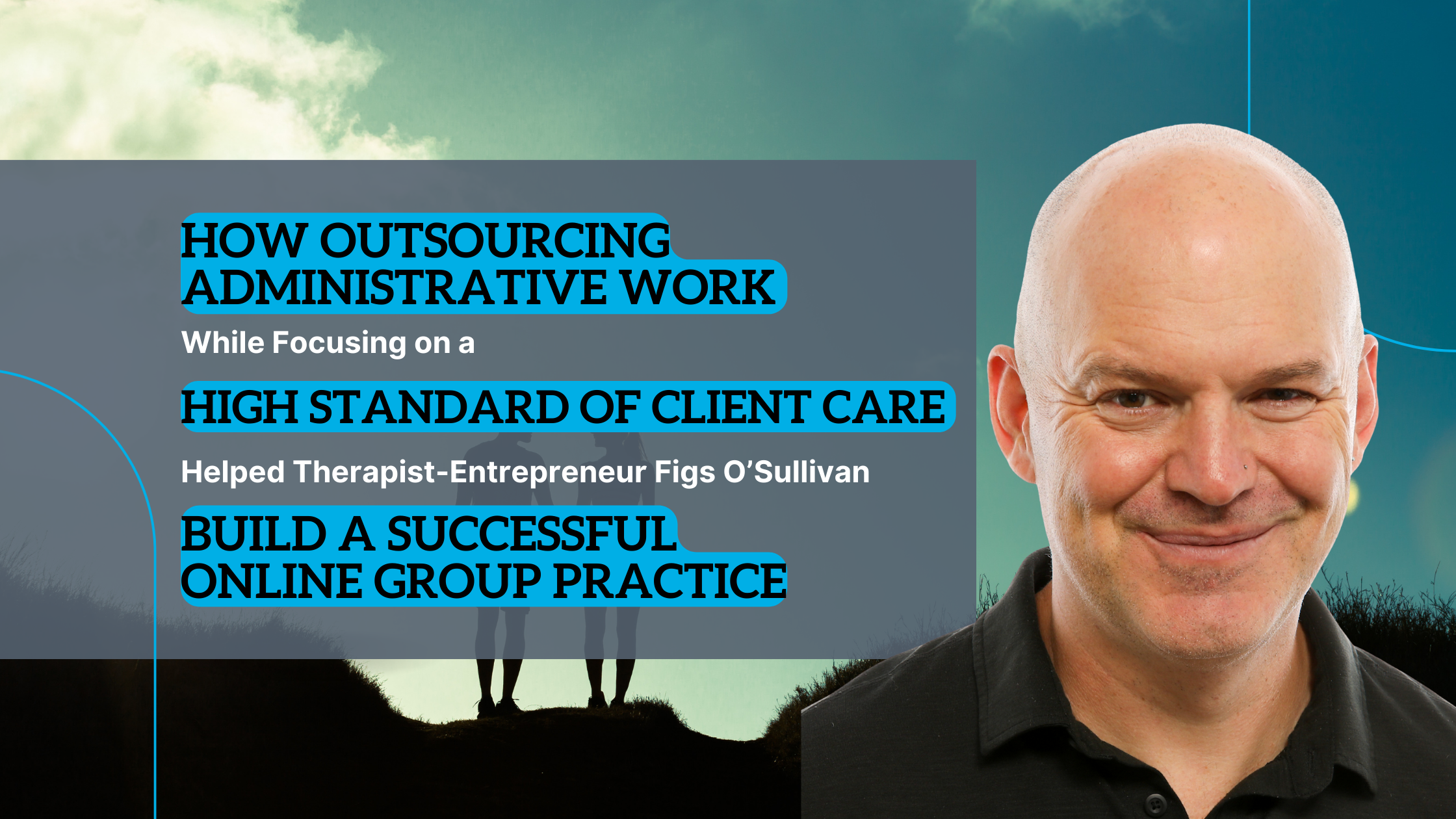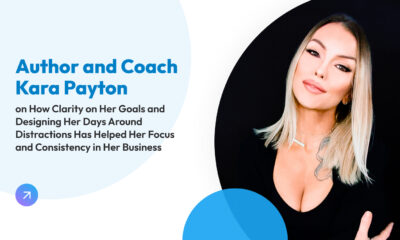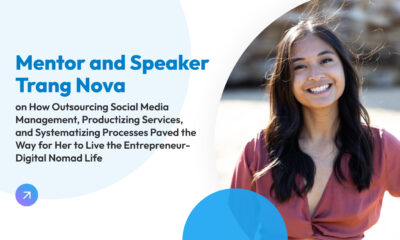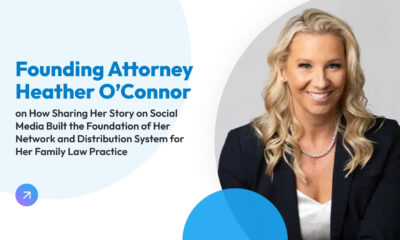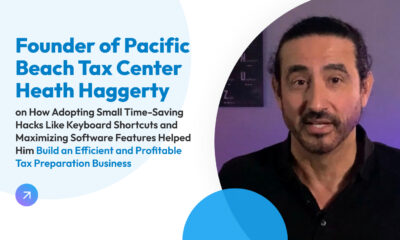Case Study
How Outsourcing Administrative Work, While Focusing on a High Standard of Client Care, Helped Therapist-Entrepreneur Figs O’Sullivan Build a Successful Online Group Practice
Building a thriving business on something he is deeply passionate about was the driving force for Figs O’Sullivan. After spending 14 years in finance, business development, and consulting for online education companies, he started on a new path to studying, training for, and creating a counseling service specializing in couples therapy.
Empathi started as a one-man practice with O’Sullivan seeing all the clients himself, to now being a group practice of 20 therapists providing online couples counseling. In this article, he tells us about the hurdles he had to overcome at each stage in growing the company and the people, systems and tools that were key to his success. Don’t forget to check out the end with a summary of O’Sullivan’s Productivity Stack Quick Reference and his Read-Watch-Listen List!
Table of Contents
- Starting
- Growing
- Challenge 2: A good problem – How to manage a solo practice with too many clients
- Challenge 3: How to set up a group practice and dealing with the burden of administrative tasks
- Challenge 4: Get back to clients within 30 minutes – How to improve responsiveness to prospective clients
- Challenge 5: Family and business – How to grow the practice while raising a young family
- Challenge 6: Distribution & How to determine if a project is worth pursuing
- Challenge 7: Bringing the business online – How to transition clients to a new channel or method of delivery
- Scaling
- Hindsight: What O’Sullivan would have done differently
- A Useful Reminder for the Anxious Entrepreneur
- Wrap-up
- O’Sullivan’s Read-Watch-Listen List
- O’Sullivan’s Productivity Stack Quick Reference
- More about Figs O’Sullivan
Starting
Challenge 1: How to get enough clients to keep the lights on
O’Sullivan loved the craft of psychotherapy and helping people get to know themselves better and have healthier relationships. But in starting a new practice, he also had to think of how to make it a sustainable business.
In the beginning, his main goal was just to get fully booked with clients. He believed this was the first barometer that would determine whether his new venture was going to succeed. “The first thing I wanted to do was just to get full with clients [for myself].”
Solution: O’Sullivan attended as many training seminars as possible. He used these events to network, and get the word out about his practice and his approach to relationship counseling. “I met every person and I talked at every training.”
He dedicated himself fully to the business, seeing 30 clients a week and working long hours. This paid off with good reviews that also brought in new clients.
He also emphasized his focus on great design (on his website and even his business cards) as one major contributor to lead generation. “..what’s your website look like? Is it modern? Is it up to date? Especially given the fact we serve San Francisco, Silicon Valley..” He knew his market would make quick judgments about his business simply by the look and feel of his website.
People: Figs O’Sullivan
Systems: Attending professional training and actively networking with peers. Focusing on web design, making sure it is up-to-date and appealing to the target market.
Tools: ScheduleOnce appointment setting system (now called Oncehub), WordPress and Elementor for the website
Growing
Challenge 2: A good problem – How to manage a solo practice with too many clients
From referrals, reviews, and his website, O’Sullivan started to get too many clients for a one-person practice. At first, he was hesitant to send new clients to other therapists. “I really feel like if someone reaches out to me, it’s my responsibility to get them effective help.” He did not trust other therapists to provide the kind of service that he would have provided himself.
Solution: O’Sullivan decided to train other therapists to use his methods and approach. He trained them in Emotionally Focused Couples Therapy or EFT, the gold standard to help couples improve their relationship.
This gave him the confidence and trust that he could refer his clients and they will get the same level of service and care as they would with him. Initially, for a few months, he simply referred clients to his network of trained and trusted therapists who were not part of his practice. Eventually, he hired them as employees of his group.
People: Figs O’Sullivan, other therapists who trained with him
Systems: Training seminars on Emotionally Focused Couples Therapy, referral system to assign new clients to other therapists
Tools: Oncehub appointment setting system
Challenge 3: How to set up a group practice and dealing with the burden of administrative tasks
O’Sullivan is very candid about how he struggles with and is burdened by simple administrative matters. He knew he needed to set up a group practice to handle growing client demand, but didn’t have the inclination to do this himself. “I’m a burdened personality type. I needed someone just to take the burden away.”
Solution: He hired a friend, who had just set up his own group practice to take care of this whole process. Luckily for O’Sullivan, this friend had also set up a virtual assistant (VA) company, ProductiveTherapist.com specifically dedicated to helping set up group counseling practices.
The VA company took care of legal matters, systems, and software. They got O’Sullivan’s office set up on a client management system (SimplePractice), ScheduleOnce (now Oncehub), and Zoom for Healthcare, and organized their Google Workspace and project management tools (Trello, Notion, Superhuman, Slack).
One key addition was getting a VA to handle the client intake process which O’Sullivan was handling entirely by himself previously.
People: Figs O’Sullivan, Productive Therapist team
Systems: Outsourcing tasks and big projects to virtual assistants and consulting companies
Tools: SimplePractice, Google Workspace, Trello, Notion, Superhuman, Slack, Oncehub, Zoom for Healthcare
Challenge 4: Get back to clients within 30 minutes – How to improve responsiveness to prospective clients
Potential clients will get in touch with you any time of the day, and getting them to sign up for therapy requires getting back to them as soon as possible. This was something O’Sullivan learned in his years with a for-profit online education institution. “Whoever gets back to the prospective student first wins.”
In the beginning, O’Sullivan himself answered all the inquiries himself and of course, this was not sustainable or effective for a growing business. He realized too that therapists tended to be rather formal when they responded to clients – which led to much longer response times. He knew this meant they were losing opportunities to get new clients.
Solution: O’Sullivan was insistent on creating a culture that is “ultra-responsive” to clients. “When a lead came in, you had to call the person back within 30 minutes, you just have to. It doesn’t matter where I am, I’m going to call someone back. If I’m on the beach, I’m going to call them back.”
One part of this solution involved hiring dedicated staff to respond to client inquiries. The other part was training his therapists to embrace ‘just do it now’. He instilled in them, especially the more senior ones, that they need to leave behind the old ways of finding the perfect time and being so formal about getting back in touch with clients. “Stop waiting for the perfect moment to get back to clients. Do it now. Teeth whitener in? Just go ahead and call them or text them.”
People: Figs O’Sullivan, therapists, administrative assistant to handle inquiries
Systems: “Just do it now” system. Having dedicated staff to respond to client calls and messages, while therapists are encouraged to be responsive to clients as well.
Tools: Oncehub, phones, email
Challenge 5: Family and business – How to grow the practice while raising a young family
O’Sullivan and his wife Teale, who is also a therapist, had very young children as the business was getting busier. They both did client sessions in the office and managed the business at the same time. This hectic phase in their lives needed a ‘time management’ system to balance family and their young kids while making sure everything was on track with the counseling business.
Solution: The couple used a ‘bifurcated sleep’ system, where they go to bed with the kids at 7 or 8 pm, then get up to work from 10 to 1 am. This allowed them to carve out dedicated hours for work without sacrificing time with their young children. They also took turns watching the kids in the clinic depending on who had a client session.
Later on, O’Sullivan trained himself to be a morning person, blocking 5 – 7 am purely to work on the business, doing some writing or recording videos. This is the system he uses even now, separating the hours for the business side of things versus the client session hours.
He says of his work as a therapist with clients: “It just demands a thousand percent presence and there’s just nothing else…the business stuff is just a whole other beast.”
People: Figs and Teale O’Sullivan, administrative assistant to handle inquiries
Systems: Time blocking
Tools: Calendar or other Scheduling apps like Google Calendar to set out daily schedules, Oncehub
Challenge 6: Distribution & How to determine if a project is worth pursuing
O’Sullivan constantly thought about how to reach more clients. “I was trying to see how we go from just one couple in the office or one individual in the office to helping millions of people.”
Inspired by the startup and technology culture of the market they served, O’Sullivan decided to develop an app with a quiz and a couples counseling course available for purchase. He thought this was an effective way to scale the practice, and diverted attention and resources from the growing counseling business.
Solution: An honest review of what lead generation tools actually brought in more paying clients showed it was the Empathi website that brought in about one-third of their booking confirmations. This website did not even actively market their counseling service, but just provided educational content that built trust and credibility in the group practice.
O’Sullivan came to accept that people were looking for counseling, and didn’t want a DIY solution to their relationship problems. “Let’s say you had a fight with your spouse the night before. No one woke up in the morning and said, you know what I need? I need a relationship counseling course.”
Although the app is a project still very dear to him, he has come to accept it is just not something the market wanted or the business needed. They did have about 16,000 downloads on the app, and the quiz has been repurposed to their website as a very effective lead magnet.
O’Sullivan realized he had to focus his efforts and resources on what works–the counseling business– and accelerate that. It was at this point that they decided to focus on the brand Empathi. While previously it was a group practice bearing his name, a pivot to bringing the group practice under this brand made the business more inclusive for the other therapists and created an identity they could all get behind.
People: Figs O’Sullivan
Systems: Review of lead generation channels, impact assessment for the new project
Tools: Empathi app turned quiz, Empathi website, Oncehub
Challenge 7: Bringing the business online – How to transition clients to a new channel or method of delivery
O’Sullivan had wanted to bring their counseling services online but was never able to strictly implement a test rollout for this method of connecting with their clients. “We tried to run experiments where we only offered online. But we weren’t very good at running strict experiments.” When clients requested to come to the office for sessions they would just let them.
Solution: This all changed when the COVID lockdowns were imposed, as Empathi and their clients were forced to go online. Clients who were mostly professionals, founders of startups, and managers of tech companies realized telehealth was a viable option. “So we moved to all online in 2020. We had no choice at first, but now we’ve decided to stay.”
People: Figs and Teale O’Sullivan, therapists, the administrative team who helped set up telehealth systems
Systems: Offering alternative methods of delivery of service to clients, Utilizing technology to deal with external constraints on the business.
Tools: Oncehub, Zoom for Healthcare, email, and phones to communicate with clients on the new setup
Scaling
Challenge 8: Don’t rush to the finish line – How to scale while maintaining their service standards
O’Sullivan shared that “We have designs to be the number one place for couples counseling online in America.” The challenge lies in achieving this growth while maintaining the quality of their services and making sure all their therapists meet a high standard of customer care and performance.
Solution: At Empathi, they require all their therapists to practice only emotionally-focused couples therapy (EFT). Not only does this set them apart from other counseling services where therapists have leeway to use whatever methodology they prefer, but O’Sullivan is firm about using only EFT “..because it works.” Empathi therapists receive a lot of continuous training, with at least four hours of in-house training every week, covering everything from how to be effective with their clients, as well as legal and ethical matters.
But more than this, O’Sullivan speaks of creating a culture of meritocracy among the therapists. “We believe in equal opportunity but not equal outcomes for the therapist.” They are evaluated based on their engagement in training, ability to convert prospects, retain clients, and positive client feedback. The best therapists get the leads and this is also reflected in higher fees per hour.
People: Figs and Teale O’Sullivan, Other Training Leader at Empathi
Systems: Strict implementation of using EFT only, Continuous training for therapists, Meritocracy-based system
Tools: Oncehub, Zoom for Healthcare, Training delivery tools, Performance Management System to monitor and evaluate therapists
Challenge 9: Next steps – How to scale the business so you don’t have to be there every day
O’Sullivan had always been a worrier, a tendency that has helped him push through the starting and growing stages of the business. In the beginning, his worrying spurred him to pursue landing as many clients as possible because he worried what would happen otherwise. Today, while O’Sullivan loves being a therapist and being in sessions with clients, he also constantly thinks about the next step for the business.
“I want to be able to be a therapist only out of inspiration.” He and eventually his wife would like practicing as a therapist to be fully optional, with the business no longer reliant on the revenue from their client sessions.
Solution: The couple has decided to invest in systems and setting up the organization to be ready to scale. This has actually resulted in a decrease in profitability in 2022, even though they grew client revenue. But they believe the investment in systems and hiring additional employees for managing payroll, marketing, administration and clinical matters, intake coordination, and training will enable Empathi to be ready to scale up.
People: Figs and Teale O’Sullivan, employees hired for the support roles in Empathi
Systems: Organizational restructuring, adoption of more systems and technology to streamline processes
Tools: Google Workspace, Trello, Notion, Superhuman, Slack (used for discussion and planning about these strategic investments and restructuring)
Hindsight: What O’Sullivan would have done differently
O’Sullivan regrets being impatient and not consistently implementing his social media strategy in the last 11 to 12 years. He didn’t see the value back then and wondered why he was spending money on it.
Now he sees the missed opportunities to reach all those people who weren’t necessarily looking for counseling services at that very moment, but might have later because Empathi’s online presence is not as established and dominant as it could have been. “I really believe in creating a platform, putting out good content, and growing a brand people can really trust. Then people will come to us in 6 months to two years from now.”
Another thing he learned was in relation to branding. Not having separated the Figs O’Sullivan brand from the Empathi brand early on had its benefits and he doesn’t believe they should have separated earlier. But he does admit that at some point it got confusing and muddied the marketing message.
Lastly, he admits it took too long for him to realize that the creation of his passion project, the app “that nobody ever asked for,” was a diversion that didn’t serve the business. He realized he needed to stop focusing efforts on what was not working and instead focus on what is working and help that grow.
A Useful Reminder for the Anxious Entrepreneur
When asked about what books or mentors helped him in growing the business, O’Sullivan mentioned how listening to podcasts or interviews of business personalities like Gary Vee, FUTR and Garry Tan is helpful. “A lot of times I’m still waiting to find the miracle shot. I find it helpful just to hear how methodical, consistent work and just going on and never giving up are what I should focus on.”
Wrap-up
O’Sullivan’s journey from solo therapist to a thriving online group practice for couples therapy began with his passion for supporting people struggling in their relationships and has been spurred along by his constant search for (and worry about) the next stage of growth for Empathi.
We see a few elements which contribute to this success. One is his commitment to providing a very high quality of service to clients – as seen in his discipline with using the gold standard for couples counseling, responsiveness to clients, and creating a culture of excellence and customer focus among Empathi’s therapists. The other is his ability to recognize and work with his strengths while seeking help where he struggled. We see this in how he used his personal brand to establish his practice, meanwhile seeking external support for the administrative side of the business. His realization about missteps in pursuing a project or discontinuing their social media strategy reminds us to have an evaluation system in place, to constantly assess what is working and what is not. Lastly, his tendency to worry about the business, while it has its drawbacks, has served as a great motivator for him to work hard and continue looking ahead at what they can do better.
Empathi continues to grow its social media and online presence today. We look forward to seeing them as the top online couples counseling provider in the US in the near future.
O’Sullivan’s Read-Watch-Listen List
O’Sullivan’s Productivity Stack Quick Reference
Starting Stack
Growing Stack
Scaling & Success Stack
More about Figs O’Sullivan
Fiachra “Figs” O’Sullivan is a Licensed Marriage and Family Therapist, certified in Emotionally-Focused Therapy, and the founder of Empathi. Figs is a passionate entrepreneur, driven to change lives for the better. He strives to interact with the clients as fellow travelers on life’s journey, allowing them to easily dive deeper into their “stuff” with his down-to-earth philosophy.
Figs has spent years working with frustrated couples at a crossroads in their relationship—they want to make things work but are stuck in what Figs calls their “Waltz of Pain”—which is what led him to create Empathi! Inspired by attachment theory, improvisational dance and theater, experiential psychotherapy, and EFT, Empathi provides fun, effective, and simple solutions to help couples stop fighting and snuggle more.
Create an empathi.com account and visit empathi.com/pod to redeem our flagship Conflict Solution course, free of charge!
You can find him on:
Instagram: https://www.instagram.com/Empathinow/
YouTube: https://www.youtube.com/channel/UCnPbjlO6Q0KBXVHXeGyivlw


